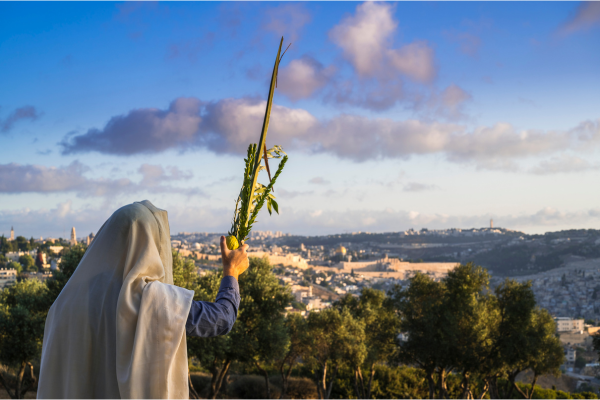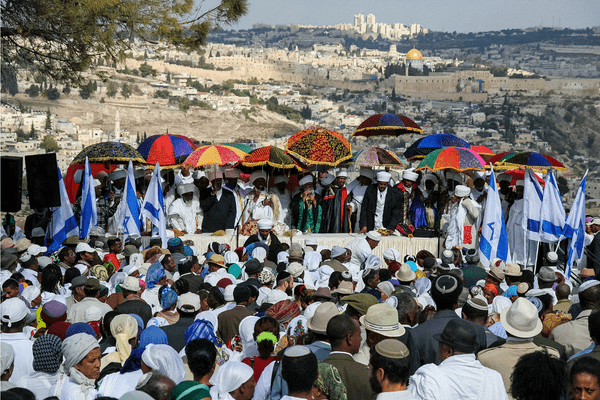
TORAH
NEVI'IM
KETUVIM
Chapter 52
Translation and Transliteration of
Listen to this chapter in Hebrew:
- Commentary
- Buy E-book
- Buy the Israel Bible
1Tzidkiyahu was twenty-one years old when he became king, and he reigned in Yerushalayim for eleven years. His mother's name was Hamutal, daughter of Yirmiyahu of Libnah.
אבֶּן־עֶשְׂרִים וְאַחַת שָׁנָה צִדְקִיָּהוּ בְמָלְכוֹ וְאַחַת עֶשְׂרֵה שָׁנָה מָלַךְ בִּירוּשָׁלִָם וְשֵׁם אִמּוֹ חמיטל [חֲמוּטַל] בַּת־יִרְמְיָהוּ מִלִּבְנָה׃
2He did what was displeasing to Hashem, just as Yehoyakim had done.
בוַיַּעַשׂ הָרַע בְּעֵינֵי יְהֹוָה כְּכֹל אֲשֶׁר־עָשָׂה יְהוֹיָקִים׃
3Indeed, Yerushalayim and Yehuda were a cause of anger for Hashem, so that He cast them out of His presence. Tzidkiyahu rebelled against the king of Babylon.
KEE al AF a-do-NAI ha-y'-TAH bee-ru-sha-LA-im vee-hu-DAH ad hish-li-KHO o-TAM may-AL pa-NAV va-yim-ROD tzid-ki-YA-hu b'-ME-lekh ba-VEL
גכִּי עַל־אַף יְהֹוָה הָיְתָה בִּירוּשָׁלַ ִם וִיהוּדָה עַד־הִשְׁלִיכוֹ אוֹתָם מֵעַל פָּנָיו וַיִּמְרֹד צִדְקִיָּהוּ בְּמֶלֶךְ בָּבֶל׃
52:3 Indeed, Yerushalayim and Yehuda were a cause of anger for Hashem
Yirmiyahu’s final chapter repeats the description of the downfall of Yehuda and Yerushalayim at the hands of the Babylonians. One might be tempted to separate Hashem from history, and state that politics and theology do not mix. What Yirmiyahu teaches is that the two work hand-in-hand. On the surface, Babylonia is another superpower overrunning a minor, vassal state. However, Yehuda is vulnerable not because of its small army, but because it refuses to perform justice and righteousness, and worships idols in Hashem‘s holy land. It is their sinful behavior and God’s corresponding anger that leads to Israel’s exile, just as God’s everlasting love for His people and His land will eventually lead to their full return and restoration, and to the redemption of the entire world.
4And in the ninth year of his reign, on the tenth day of the tenth month, King Nebuchadrezzar moved against Yerushalayim with his whole army. They besieged it and built towers against it all around.
דוַיְהִי בַשָּׁנָה הַתְּשִׁעִית לְמָלְכוֹ בַּחֹדֶשׁ הָעֲשִׂירִי בֶּעָשׂוֹר לַחֹדֶשׁ בָּא נְבוּכַדְרֶאצַּר מֶלֶךְ־בָּבֶל הוּא וְכָל־חֵילוֹ עַל־יְרוּשָׁלַ ִם וַיַּחֲנוּ עָלֶיהָ וַיִּבְנוּ עָלֶיהָ דָּיֵק סָבִיב׃
5The city continued in a state of siege until the eleventh year of King Tzidkiyahu.
הוַתָּבֹא הָעִיר בַּמָּצוֹר עַד עַשְׁתֵּי עֶשְׂרֵה שָׁנָה לַמֶּלֶךְ צִדְקִיָּהוּ׃
6By the ninth day of the fourth month, the famine had become acute in the city; there was no food left for the common people.
ובַּחֹדֶשׁ הָרְבִיעִי בְּתִשְׁעָה לַחֹדֶשׁ וַיֶּחֱזַק הָרָעָב בָּעִיר וְלֹא־הָיָה לֶחֶם לְעַם הָאָרֶץ׃
7Then [the wall of] the city was breached. All the soldiers fled; they left the city by night through the gate between the double walls, which is near the king's garden—the Chaldeans were all around the city—and they set out for the Arabah.
זוַתִּבָּקַע הָעִיר וְכָל־אַנְשֵׁי הַמִּלְחָמָה יִבְרְחוּ וַיֵּצְאוּ מֵהָעִיר לַיְלָה דֶּרֶךְ שַׁעַר בֵּין־הַחֹמֹתַיִם אֲשֶׁר עַל־גַּן הַמֶּלֶךְ וְכַשְׂדִּים עַל־הָעִיר סָבִיב וַיֵּלְכוּ דֶּרֶךְ הָעֲרָבָה׃
8But the Chaldean troops pursued the king, and they overtook Tzidkiyahu in the steppes of Yericho, as his entire force left him and scattered.
חוַיִּרְדְּפוּ חֵיל־כַּשְׂדִּים אַחֲרֵי הַמֶּלֶךְ וַיַּשִּׂיגוּ אֶת־צִדְקִיָּהוּ בְּעַרְבֹת יְרֵחוֹ וְכָל־חֵילוֹ נָפֹצוּ מֵעָלָיו׃
9They captured the king and brought him before the king of Babylon at Riblah, in the region of Hamath; and he put him on trial.
טוַיִּתְפְּשׂוּ אֶת־הַמֶּלֶךְ וַיַּעֲלוּ אֹתוֹ אֶל־מֶלֶךְ בָּבֶל רִבְלָתָה בְּאֶרֶץ חֲמָת וַיְדַבֵּר אִתּוֹ מִשְׁפָּטִים׃
10The king of Babylon had Tzidkiyahu's sons slaughtered before his eyes; he also had all the officials of Yehuda slaughtered at Riblah.
יוַיִּשְׁחַט מֶלֶךְ־בָּבֶל אֶת־בְּנֵי צִדְקִיָּהוּ לְעֵינָיו וְגַם אֶת־כָּל־שָׂרֵי יְהוּדָה שָׁחַט בְּרִבְלָתָה׃
11Then the eyes of Tzidkiyahu were put out, and he was chained in bronze fetters. The king of Babylon brought him to Babylon and put him in prison, [where he remained] to the day of his death.
יאוְאֶת־עֵינֵי צִדְקִיָּהוּ עִוֵּר וַיַּאַסְרֵהוּ בַנְחֻשְׁתַּיִם וַיְבִאֵהוּ מֶלֶךְ־בָּבֶל בָּבֶלָה וַיִּתְּנֵהוּ בבית־[בֵית־] הַפְּקֻדֹּת עַד־יוֹם מוֹתוֹ׃
12On the tenth day of the fifth month—that was the nineteenth year of King Nebuchadrezzar, the king of Babylon—Nebuzaradan, the chief of the guards, came to represent the king of Babylon in Yerushalayim.
יבוּבַחֹדֶשׁ הַחֲמִישִׁי בֶּעָשׂוֹר לַחֹדֶשׁ הִיא שְׁנַת תְּשַׁע־עֶשְׂרֵה שָׁנָה לַמֶּלֶךְ נְבוּכַדְרֶאצַּר מֶלֶךְ־בָּבֶל בָּא נְבוּזַרְאֲדָן רַב־טַבָּחִים עָמַד לִפְנֵי מֶלֶךְ־בָּבֶל בִּירוּשָׁלִָם׃
13He burned the House of Hashem, the king's palace, and all the houses of Yerushalayim; he burned down the house of every notable person.
יגוַיִּשְׂרֹף אֶת־בֵּית־יְהֹוָה וְאֶת־בֵּית הַמֶּלֶךְ וְאֵת כָּל־בָּתֵּי יְרוּשָׁלַ ִם וְאֶת־כָּל־בֵּית הַגָּדוֹל שָׂרַף בָּאֵשׁ׃
14The entire Chaldean force that was with the chief of the guards tore down all the walls of Yerushalayim on every side.
ידוְאֶת־כָּל־חֹמוֹת יְרוּשָׁלַ ִם סָבִיב נָתְצוּ כָּל־חֵיל כַּשְׂדִּים אֲשֶׁר אֶת־רַב־טַבָּחִים׃
15The remnant of the people left in the city, the defectors who had gone over to the king of Babylon, and what remained of the craftsmen were taken into exile by Nebuzaradan, the chief of the guards. But some of the poorest elements of the population—
טווּמִדַּלּוֹת הָעָם וְאֶת־יֶתֶר הָעָם הַנִּשְׁאָרִים בָּעִיר וְאֶת־הַנֹּפְלִים אֲשֶׁר נָפְלוּ אֶל־מֶלֶךְ בָּבֶל וְאֵת יֶתֶר הָאָמוֹן הֶגְלָה נְבוּזַרְאֲדָן רַב־טַבָּחִים׃
16some of the poorest in the land—were left by Nebuzaradan, the chief of the guards, to be vine-dressers and field hands.
טזוּמִדַּלּוֹת הָאָרֶץ הִשְׁאִיר נְבוּזַרְאֲדָן רַב־טַבָּחִים לְכֹרְמִים וּלְיֹגְבִים׃
17The Chaldeans broke up the bronze columns of the House of Hashem, the stands, and the bronze tank that was in the House of Hashem; and they carried all the bronze away to Babylon.
יזוְאֶת־עַמּוּדֵי הַנְּחֹשֶׁת אֲשֶׁר לְבֵית־יְהֹוָה וְאֶת־הַמְּכֹנוֹת וְאֶת־יָם הַנְּחֹשֶׁת אֲשֶׁר בְּבֵית־יְהֹוָה שִׁבְּרוּ כַשְׂדִּים וַיִּשְׂאוּ אֶת־כָּל־נְחֻשְׁתָּם בָּבֶלָה׃
18They also took the pails, scrapers, snuffers, sprinkling bowls, ladles, and all the other bronze vessels used in the service.
יחוְאֶת־הַסִּרוֹת וְאֶת־הַיָּעִים וְאֶת־הַמְזַמְּרוֹת וְאֶת־הַמִּזְרָקֹת וְאֶת־הַכַּפּוֹת וְאֵת כָּל־כְּלֵי הַנְּחֹשֶׁת אֲשֶׁר־יְשָׁרְתוּ בָהֶם לָקָחוּ׃
19The chief of the guards took whatever was of gold and whatever was of silver: basins, fire pans, sprinkling bowls, pails, menorahs, ladles, and jars.
יטוְאֶת־הַסִּפִּים וְאֶת־הַמַּחְתּוֹת וְאֶת־הַמִּזְרָקוֹת וְאֶת־הַסִּירוֹת וְאֶת־הַמְּנֹרוֹת וְאֶת־הַכַּפּוֹת וְאֶת־הַמְּנַקִיוֹת אֲשֶׁר זָהָב זָהָב וַאֲשֶׁר־כֶּסֶף כָּסֶף לָקַח רַב־טַבָּחִים׃
20The two columns, the one tank and the twelve bronze oxen which supported it, and the stands, which King Shlomo had provided for the House of Hashem—all these objects contained bronze beyond weighing.
כהָעַמּוּדִים שְׁנַיִם הַיָּם אֶחָד וְהַבָּקָר שְׁנֵים־עָשָׂר נְחֹשֶׁת אֲשֶׁר־תַּחַת הַמְּכֹנוֹת אֲשֶׁר עָשָׂה הַמֶּלֶךְ שְׁלֹמֹה לְבֵית יְהֹוָה לֹא־הָיָה מִשְׁקָל לִנְחֻשְׁתָּם כָּל־הַכֵּלִים הָאֵלֶּה׃
21As for the columns, each was eighteen amot high and twelve amot in circumference; it was hollow, and [the metal] was four fingers thick.
כאוְהָעַמּוּדִים שְׁמֹנֶה עֶשְׂרֵה אַמָּה קומה [קוֹמַת] הָעַמֻּד הָאֶחָד וְחוּט שְׁתֵּים־עֶשְׂרֵה אַמָּה יְסֻבֶּנּוּ וְעָבְיוֹ אַרְבַּע אַצְבָּעוֹת נָבוּב׃
22It had a bronze capital above it; the height of each capital was five amot, and there was a meshwork [decorated] with pomegranates about the capital, all made of bronze; and so for the second column, also with pomegranates.
כבוְכֹתֶרֶת עָלָיו נְחֹשֶׁת וְקוֹמַת הַכֹּתֶרֶת הָאַחַת חָמֵשׁ אַמּוֹת וּשְׂבָכָה וְרִמּוֹנִים עַל־הַכּוֹתֶרֶת סָבִיב הַכֹּל נְחֹשֶׁת וְכָאֵלֶּה לַעַמּוּד הַשֵּׁנִי וְרִמּוֹנִים׃
23There were ninety-six pomegranates facing outward; all the pomegranates around the meshwork amounted to one hundred.
כגוַיִּהְיוּ הָרִמֹּנִים תִּשְׁעִים וְשִׁשָּׁה רוּחָה כָּל־הָרִמּוֹנִים מֵאָה עַל־הַשְּׂבָכָה סָבִיב׃
24The chief of the guards also took Seraya the chief Kohen and Tzefanya, the deputy Kohen, and the three guardians of the threshold.
כדוַיִּקַּח רַב־טַבָּחִים אֶת־שְׂרָיָה כֹּהֵן הָרֹאשׁ וְאֶת־צְפַנְיָה כֹּהֵן הַמִּשְׁנֶה וְאֶת־שְׁלֹשֶׁת שֹׁמְרֵי הַסַּף׃
25And from the city he took a eunuch who was in command of the soldiers; seven royal privy councilors, who were present in the city; the scribe of the army commander, who was in charge of mustering the people of the land; and sixty of the common people who were inside the city.
כהוּמִן־הָעִיר לָקַח סָרִיס אֶחָד אֲשֶׁר־הָיָה פָקִיד עַל־אַנְשֵׁי הַמִּלְחָמָה וְשִׁבְעָה אֲנָשִׁים מֵרֹאֵי פְנֵי־הַמֶּלֶךְ אֲשֶׁר נִמְצְאוּ בָעִיר וְאֵת סֹפֵר שַׂר הַצָּבָא הַמַּצְבִּא אֶת־עַם הָאָרֶץ וְשִׁשִּׁים אִישׁ מֵעַם הָאָרֶץ הַנִּמְצְאִים בְּתוֹךְ הָעִיר׃
26Nebuzaradan, the chief of the guards, took them and brought them to the king of Babylon at Riblah.
כווַיִּקַּח אוֹתָם נְבוּזַרְאֲדָן רַב־טַבָּחִים וַיֹּלֶךְ אוֹתָם אֶל־מֶלֶךְ בָּבֶל רִבְלָתָה׃
27The king of Babylon had them struck down and put to death at Riblah, in the region of Hamath. Thus Yehuda was exiled from its land.
כזוַיַּכֶּה אוֹתָם מֶלֶךְ בָּבֶל וַיְמִתֵם בְּרִבְלָה בְּאֶרֶץ חֲמָת וַיִּגֶל יְהוּדָה מֵעַל אַדְמָתוֹ׃
28This is the number of those whom Nebuchadrezzar exiled in the seventh year: 3,023 Judeans.
כחזֶה הָעָם אֲשֶׁר הֶגְלָה נְבוּכַדְרֶאצַּר בִּשְׁנַת־שֶׁבַע יְהוּדִים שְׁלֹשֶׁת אֲלָפִים וְעֶשְׂרִים וּשְׁלֹשָׁה׃
29In the eighteenth year of Nebuchadrezzar, 832 persons [were exiled] from Yerushalayim.
כטבִּשְׁנַת שְׁמוֹנֶה עֶשְׂרֵה לִנְבוּכַדְרֶאצַּר מִירוּשָׁלַ ִם נֶפֶשׁ שְׁמֹנֶה מֵאוֹת שְׁלֹשִׁים וּשְׁנָיִם׃
30And in the twenty-third year of Nebuchadrezzar, Nebuzaradan, the chief of the guards, exiled 745 Judeans. The total amounted to 4,600 persons.
לבִּשְׁנַת שָׁלֹשׁ וְעֶשְׂרִים לִנְבוּכַדְרֶאצַּר הֶגְלָה נְבוּזַרְאֲדָן רַב־טַבָּחִים יְהוּדִים נֶפֶשׁ שְׁבַע מֵאוֹת אַרְבָּעִים וַחֲמִשָּׁה כָּל־נֶפֶשׁ אַרְבַּעַת אֲלָפִים וְשֵׁשׁ מֵאוֹת׃
31In the thirty-seventh year of the exile of King Yehoyachin of Yehuda, on the twenty-fifth day of the twelfth month, King Evil-merodach of Babylon, in the year he became king, took note of King Yehoyachin of Yehuda and released him from prison.
לאוַיְהִי בִשְׁלֹשִׁים וָשֶׁבַע שָׁנָה לְגָלוּת יְהוֹיָכִן מֶלֶךְ־יְהוּדָה בִּשְׁנֵים עָשָׂר חֹדֶשׁ בְּעֶשְׂרִים וַחֲמִשָּׁה לַחֹדֶשׁ נָשָׂא אֱוִיל מְרֹדַךְ מֶלֶךְ בָּבֶל בִּשְׁנַת מַלְכֻתוֹ אֶת־רֹאשׁ יְהוֹיָכִין מֶלֶךְ־יְהוּדָה וַיֹּצֵא אוֹתוֹ מִבֵּית הכליא [הַכְּלוּא׃]
32He spoke kindly to him, and gave him a throne above those of other kings who were with him in Babylon.
לבוַיְדַבֵּר אִתּוֹ טֹבוֹת וַיִּתֵּן אֶת־כִּסְאוֹ מִמַּעַל לְכִסֵּא מלכים [הַמְּלָכִים] אֲשֶׁר אִתּוֹ בְּבָבֶל׃
33He removed his prison garments and [Yehoyachin] ate regularly in his presence the rest of his life.
לגוְשִׁנָּה אֵת בִּגְדֵי כִלְאוֹ וְאָכַל לֶחֶם לְפָנָיו תָּמִיד כָּל־יְמֵי חַיָּו׃
34A regular allotment of food was given him by order of the king of Babylon, an allotment for each day, to the day of his death—all the days of his life.
לדוַאֲרֻחָתוֹ אֲרֻחַת תָּמִיד נִתְּנָה־לּוֹ מֵאֵת מֶלֶךְ־בָּבֶל דְּבַר־יוֹם בְּיוֹמוֹ עַד־יוֹם מוֹתוֹ כֹּל יְמֵי חַיָּיו׃







